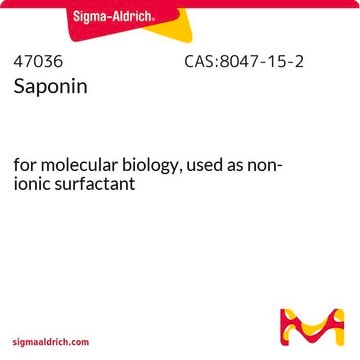Recommended Products
description
non-ionic
Quality Level
composition
Sapogenin content, 20-35%
technique(s)
HPLC: suitable
LC/MS: suitable
protein quantification: suitable
sulfated ash
≤10%
Application
Saponins has been used to permeabilize dendritic cells (DCs) for intracellular staining with antibodies.
Biochem/physiol Actions
Saponins are associated with many biological and pharmacological activities. It is known to stimulate immune response in mammals. Saponins possesses antiviral, antifungal, antitumor, anti-inflammatory, hypoglycemic and hypocholesterolemic effects. It is a potent hemolytic, when injected intravaneously. It is also useful as a surfactant to enhance penetration of proteins and other macromolecules through cell membranes. Saponins have also been used as adjuvants for vaccines.
Packaging
10, 25 g in poly bottle
Signal Word
Warning
Hazard Statements
Precautionary Statements
Hazard Classifications
Eye Irrit. 2 - STOT SE 3
Target Organs
Respiratory system
Storage Class Code
11 - Combustible Solids
WGK
WGK 2
Flash Point(F)
Not applicable
Flash Point(C)
Not applicable
Choose from one of the most recent versions:
Certificates of Analysis (COA)
Lot/Batch Number
Don't see the Right Version?
If you require a particular version, you can look up a specific certificate by the Lot or Batch number.
Already Own This Product?
Find documentation for the products that you have recently purchased in the Document Library.
Customers Also Viewed
Flavia Radogna et al.
Methods in molecular biology (Clifton, N.J.), 2276, 129-141 (2021-06-02)
Cellular energy metabolism is regulated by complex metabolic pathways. Although anaerobic glycolysis was reported as a primary source of energy in cancer leading to a high rate of lactate production, current evidence shows that the main energy source supporting cancer
Sónia A Pinho et al.
The FEBS journal, 289(17), 5198-5217 (2022-02-26)
Cell culture conditions highly influence cell metabolism in vitro. This is relevant for preclinical assays, for which fibroblasts are an interesting cell model, with applications in regenerative medicine, diagnostics and therapeutic development for personalized medicine, and the validation of ingredients for
Mitochondrial p32/C1qbp Is a Critical Regulator of Dendritic Cell Metabolism and Maturation
Gotoh K, et al.
Cell Reports, 25(7), 1800-1815 (2018)
Florian Noack et al.
Nature neuroscience, 25(2), 154-167 (2022-02-09)
How multiple epigenetic layers and transcription factors (TFs) interact to facilitate brain development is largely unknown. Here, to systematically map the regulatory landscape of neural differentiation in the mouse neocortex, we profiled gene expression and chromatin accessibility in single cells
Shuang Shen et al.
Aging and disease, 13(6), 1919-1938 (2022-12-06)
Mesenchymal stromal/stem cells (MSCs) have been considered an attractive source of cytotherapy due to their promising effects on treating various diseases. Allogeneic MSCs (allo-MSCs) are extensively used in clinical trials due to their convenient preparation and credible performance. Traditionally, allo-MSCs
Our team of scientists has experience in all areas of research including Life Science, Material Science, Chemical Synthesis, Chromatography, Analytical and many others.
Contact Technical Service















